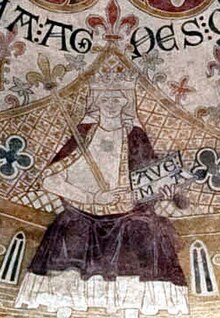| This article includes a list of general references, but it lacks sufficient corresponding inline citations. Please help to improve this article by introducing more precise citations. (May 2024) (Learn how and when to remove this message) |
| Agnes of Brandenburg | |
|---|---|
 Fresco of Queen Agnes from the ceiling of St. Bendt's Church, Ringsted Fresco of Queen Agnes from the ceiling of St. Bendt's Church, Ringsted | |
| Queen consort of Denmark | |
| Tenure | 1273–1286 |
| Born | c. 1257 |
| Died | 29 September 1304 |
| Burial | St. Bendt's Church |
| Spouse | Eric V, King of Denmark Gerhard II, Count of Holstein-Plön |
| Issue | Eric VI, King of Denmark Richeza Eriksdatter of Denmark [sv] Christopher II, King of Denmark Martha, Queen of Sweden Katharine of Denmark Valdemar of Denmark Elisabeth of Denmark John III, Count of Holstein-Plön |
| House | House of Ascania |
| Father | John I, Margrave of Brandenburg |
| Mother | Brigitte of Saxony |
Agnes of Brandenburg (c. 1257 – 29 September 1304) was a Danish Queen consort by marriage to King Eric V of Denmark. As a widow, she served as the regent of Denmark for her son, King Eric VI, during his minority from 1286 until 1293. She was duchess regnant of Estonia.
Life
She was born to John I, Margrave of Brandenburg (d. 1266) and Brigitte of Saxony, the daughter of Albert I, Duke of Saxony.
She married King Eric V of Denmark at Schleswig on 11 November 1273. The marriage was probably agreed upon during King Eric's captivity in Brandenburg by Agnes' father from 1261 to 1264. Tradition claims that the King of Denmark was released from captivity on his promise to marry Agnes without a dowry. Denmark and Brandenburg, however, had a long tradition of dynastic marriages between them.
Regency
In 1286, she became a Queen dowager and the Regent of Denmark during the minority of her son. The details of her regency are not known more closely, and it is hard to determine which of the decisions were made by her, and which were made by the council. Peder Nielsen Hoseøl was also very influential in the regency, and she is likely to have received support from her family. In 1290, she financed a granted lime painting in St. Bendt's Church in Ringsted, which depicts her in a dominating way. Her son was declared of legal majority in 1293, thus ending her formal regency.
Later life
In 1293, she married count Gerhard II of Holstein-Plön (d. 1312) with whom she had a son, John III, Count of Holstein-Plön. She often visited Denmark after her second marriage, and it continued to be a second home. She died on 29 September 1304, and was buried in Denmark.
Gallery
References
- "Regesta diplomatica historiæ danicæ. Anden Række. Første Binds første Afdeling" (PDF). slaegtsbibliotek.dk (Genealogy Library). 1889. Retrieved 22 April 2023.
Agnes Danorum Sclavorumque regina, ducissa Estoniæ, conventui ordinis Cisterciensium in civitate Revaliensi licentiam triginta uncorum comparandorum et eorum cum omnibus libertatibus, quas habent super aliis bonis suis, obtinendorum dat.
- Alf Henrikson: Dansk historia (Danish history) (1989) (Swedish)
- Sven Rosborn (In Swedish): När hände vad i Nordens historia ('When did what happen in the history of the Nordic countries') (1997)
- Dansk Kvindebiografisk Leksikon (In Danish)
| Agnes of Brandenburg House of AscaniaBorn: circa 1257 Died: 29 September 1304 | ||
| Danish royalty | ||
|---|---|---|
| Preceded byMargaret Sambiria | Queen consort of Denmark 1273–1286 |
Succeeded byIngeborg Magnusdotter of Sweden |
This Danish biographical article is a stub. You can help Misplaced Pages by expanding it. |
This biography of a member of a European royal house is a stub. You can help Misplaced Pages by expanding it. |
- 1250s births
- 1304 deaths
- 13th-century women regents
- 13th-century births
- Danish royal consorts
- Duchesses regnant
- Dukes of Estonia
- Regents of Denmark
- House of Schauenburg
- House of Ascania
- Remarried queens consort
- Burials at St. Bendt's Church, Ringsted
- 14th-century Danish nobility
- 14th-century Danish women
- 13th-century Danish nobility
- 13th-century Danish women
- Danish queen mothers
- Daughters of monarchs
- 13th-century regents
- Eric V of Denmark
- Danish people stubs
- European royalty stubs
